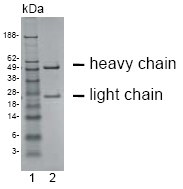CEACAM20 Mouse Monoclonal Antibody [Clone ID: HT-12D8]
Other products for "CEACAM20"
Specifications
| Product Data | |
| Clone Name | HT-12D8 |
| Applications | ELISA, FC, IF, WB |
| Recommended Dilution | Cell based ELISA with intakt, transiently transfected cells: 1/200-1/400. ELISA (capture): With clone HD-6G4-A5 as detection antibody. Flow cytometry: 1.2 µg/10e6 cells. Immunofluorescence: 1 µg/10e6 cells. |
| Reactivities | Human |
| Host | Mouse |
| Isotype | IgG1 |
| Clonality | Monoclonal |
| Immunogen | Genetic immunisation with cDNA encoding Human CEACAM20. |
| Specificity | Recognizes CEACAM20 |
| Formulation | Phosphate buffered saline, pH 7.2 State: Purified State: Liquid purified Ig fraction. |
| Concentration | lot specific |
| Purification | Affinity Chromatography on Protein G. |
| Conjugation | Unconjugated |
| Storage | Store the antibody undiluted at 2-8°C for one month or (in aliquots) at -20°C for longer. Avoid repeated freezing and thawing. |
| Stability | Shelf life: one year from despatch. |
| Gene Name | carcinoembryonic antigen related cell adhesion molecule 20 |
| Database Link | |
| Background | CEA-related cell adhesion molecule 20 (CEACAM20) belongs to the carcinoembryonic antigen (CEA) gene family (1). It encodes a putative glycoprotein which is membrane-bound via a transmembrane domain. The CEACAM20 protein contains a single N domain followed by 4 immunoglobulin-like A (A1, A2) and B (B1, B2) domains. Expression of CEACAM20 can be found in tissues of prostate, testis, duodenum and small intestine with highest expression in prostate. The function of CEACAM family members varies widely: they function as cell adhesion molecules, tumor suppressors, regulators of lymphocyte and dendritic cell activation, receptors of Neisseria species and other bacteria. High expression of CEACAM20 in tissue of prostate carcinoma and in prostate carcinoma cell lines suggest that CEACAM20 can be used as a tumor marker. |
| Synonyms | GPAD9366; UNQ9366 |
| Note | SDS-PAGE analysis: The antibody was purified by protein G affinity chromatography from cell culture supernatants and verified by SDS-Page (Figure.4). |
| Reference Data | |
| Protein Families | Transmembrane |
Documents
| Product Manuals |
| FAQs |
| SDS |
{0} Product Review(s)
0 Product Review(s)
Submit review
Be the first one to submit a review
Product Citations
*Delivery time may vary from web posted schedule. Occasional delays may occur due to unforeseen
complexities in the preparation of your product. International customers may expect an additional 1-2 weeks
in shipping.






























































































































































































































































 Germany
Germany
 Japan
Japan
 United Kingdom
United Kingdom
 China
China






